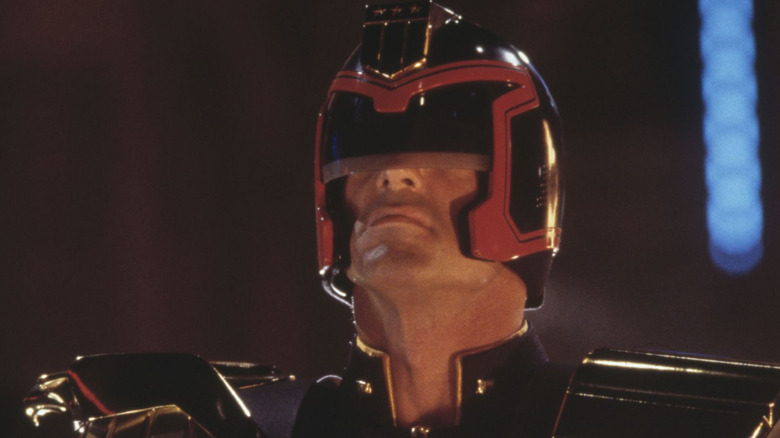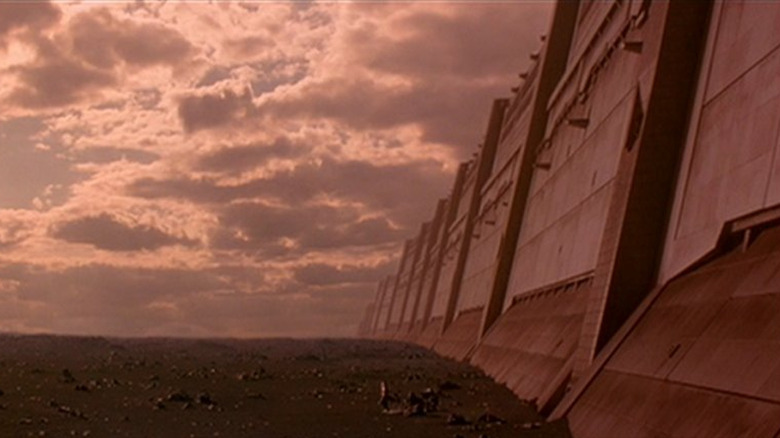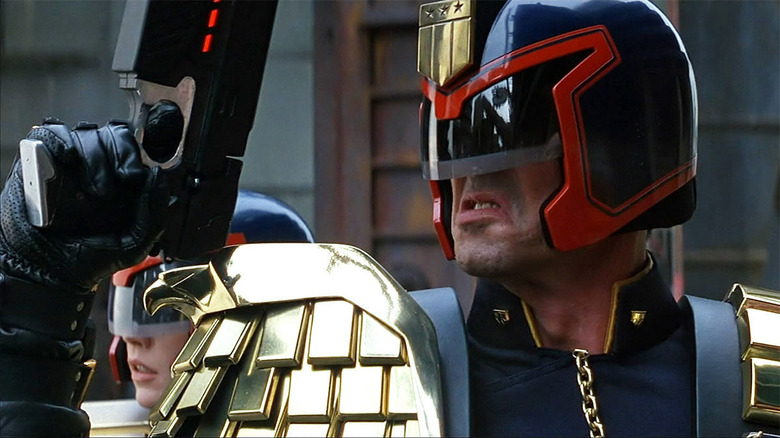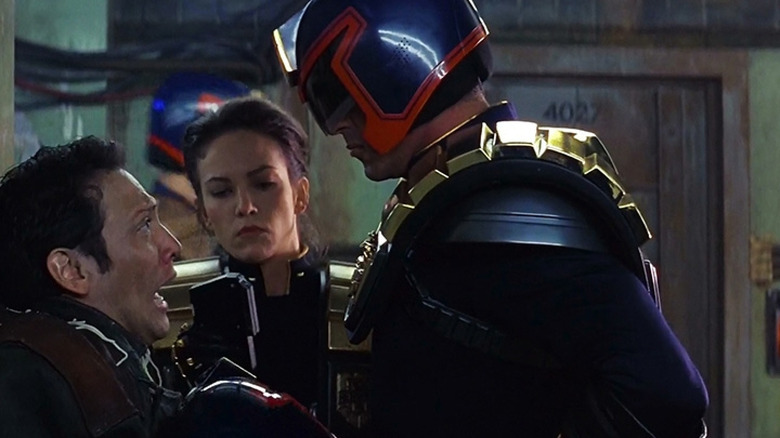Judge Dredd Is The Stupidest Science Fiction Movie To Predict Our Terrifying Present
The 1990s were awash in science fiction films trying to predict the future, likely inspired by the upcoming turn of the millennium. Fears of technology, capitalism, citizen uprisings, and more were taken to their most radical extremes and put on the big screen in movies like "Demolition Man," "Strange Days," "12 Monkeys," "Total Recall," "Johnny Mnemonic," and more. Each film had its own version of the future, though many of them shared similar cyberpunk aesthetics that were popular at the time.
One of the most ridiculous movies of the era was 1995's "Judge Dredd," based on the 2000AD comic series about a distant dystopian future where the only law enforcement are Judges, who serve as police, judge, jury, and executioner all rolled into one. While the comic series would also be adapted into the 2012 cult favorite film "Dredd," starring Karl Urban, the 1995 film is an oft-forgotten misfire with some big and not-so-strange ideas about the future. "Judge Dredd" stars Sylvester Stallone as the titular Judge Dredd, one of the most famous and successful of all Judges, who finds himself on the wrong side of the law when he's framed for murder. "Judge Dredd" has a lot to say about crime, punishment, and human nature, despite being a movie with a supporting role from Rob Schneider.
Let's take a look back at "Judge Dredd," which is quite possibly the stupidest sci-fi movie to ever actually have some prescient predictions about the perils of the future. It's not exactly a subtle satire, but the film does seem to have some pretty big ideas on its mind.
A dystopian hell-world created by climate change
"Judge Dredd" was directed by Danny Cannon, who would go on to have a prolific career in television. He's responsible for helping to create "CSI" and directing the pilot, and also helped create "Gotham" and "Pennyworth," so the guy clearly has a fascination with crime and punishment. Working from a script by William Wisher Jr., who co-wrote "Terminator" and "T2: Judgement Day" with James Cameron, and Steven E. de Souza, who wrote "Die Hard," Cannon created a shocking vision of the future where everyone is forced to live in cramped Megacities because most of the planet has been turned into a post-apocalyptic wasteland.
The source? Climate change and global warming.
That's right, back in 1995 we knew that global warming was a serious problem, and it turns the planet in "Judge Dredd" into a massive "Mad Max"-style desert with roaming bands of cannibals.
The megacities are protected from themselves by the Judges, who patrol the lawless streets and dispense a very violent form of justice. These Judges, with their red helmets, eagle-headed shoulder pauldrons, and name-plate chest badges, take the idea of policing to a whole new level. Every Judge is allowed to decide for themselves if a suspect is guilty or innocent, and they get to hand out the punishment immediately. Trials become almost non-existent, though they do exist for judges who break the law, and the average citizen should fear the judges as much as they appreciate their "service."
They are the law
The megacities are ultimately a police state, where law enforcement can get away with almost anything and are just as lawless as the citizens they claim to protect. There are some who seem to truly want to help people, like Stallone's Judge Dredd and Diane Lane's Judge Hershey, but "good" Judges cannot work within a corrupt system.
The movie's main antagonist, Rico (Armand Assante), is a Judge gone bad, and he ends up corrupting many of the other Judges. (Unsurprisingly, "Dredd" also has a subplot about a group of crooked Judges.) Because they are, as Stallone regularly reminds us, "the law," there's no one to help keep the judges in check. It's very "who watches the Watchmen?" except with the world's most over-the-top über-cops instead of superheroes.
Law enforcement, specifically policing, is a serious hot-topic issue in the United States that's still being discussed in shows like "We Own This City," and "The Boys." A wave of highly-publicized police shootings in 2020 brought the issue to the forefront once more, mirroring the 1992 beating of Rodney King by the LAPD and the subsequent L.A. riots. "Judge Dredd" is critical of the police, even if two of its heroes are members of law enforcement themselves, and that was a pretty big deal in a mainstream 1995 action movie. It feels like a response to those who called for more policing after the riots, and the film itself even has several civilian uprisings.
The people have every right to be furious, as the megacities only take care of the filthy rich and leave everyone else to fend for themselves (sound familiar?) Whenever someone gets out of line, a Judge is there to take care of the "problem."
Unfair punishments and megaprisons
Dredd ends up being sentenced to one of the mega-prisons, which are giant penal colonies, and ends up seated directly next to a man named Fergee (Schneider) whom he had just sentenced to five years in prison. Fergee was in the wrong place at the wrong time, stumbling into illegal activity in-progress. Fergee's only real crime is being annoying, but that's not deserving of a prison sentence, let alone five years. Even the "good" Judges like Dredd are capable of being far too strict and lacking in basic empathy.
Ironically enough, shortly before Dredd is wrongly accused and convicted of murder, he was punished for being too harsh on another group of criminals. His punishment? He was tasked with teaching ethics. That's right, the guy who got in trouble for killing perpetrators instead of trying to bring them to justice is punished by ... passing his not-so-great behavior onto the next generation of Judges. Yeah, great job.
Just as "Judge Dredd" critiques policing, it also challenges the court system and prisons. Everything is corrupt, and Dredd ends up being convicted because of falsified DNA evidence. It's only after he realizes just how flawed the system is that he's able to do something about it, but it's not hard to imagine the Judges going right back to corruption the second he's out of the picture.
"Judge Dredd" is a peak example of the best kinds of sci-fi movies from the 1990s, where the individual parts are better than the whole picture. There are a lot of big ideas and the movie takes some huge creative swings. It doesn't all work, but it's still a surprisingly prescient view of the future from one very silly movie.



